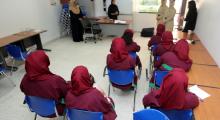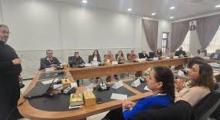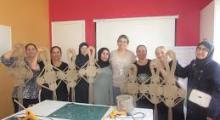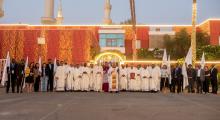Issued by the Catholic Center for Studies and Media - Jordan. Editor-in-chief Fr. Rif'at Bader - موقع أبونا abouna.org
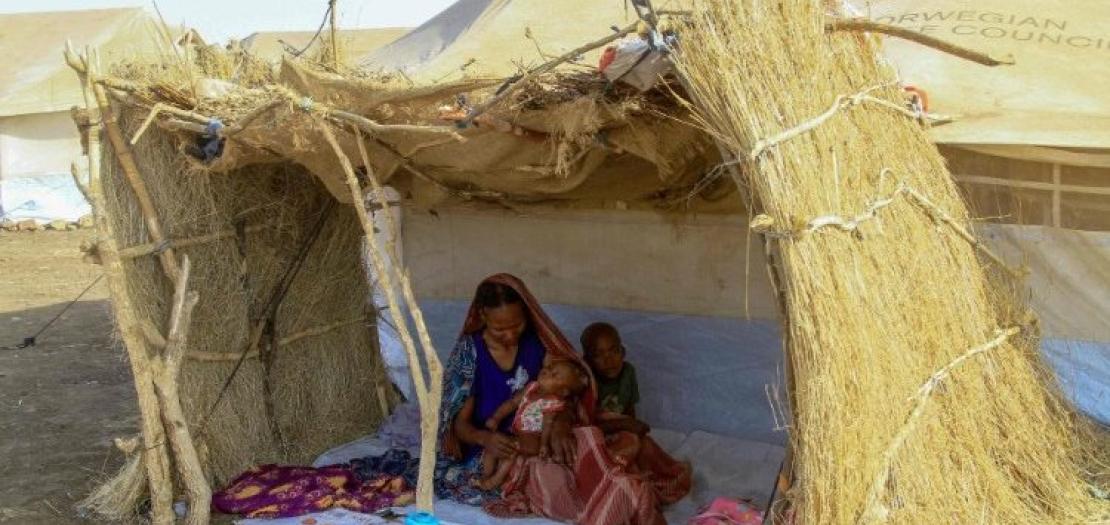
The UN reports that 12,000 civilians have been killed in Sudan’s ongoing war – although the actual death toll is believed to be much higher – and at least eight million people are displaced.
The conflict, that erupted just over a year ago between the Sudanese Army and the paramilitary Rapid Support Forces (RSF) has plunged the Northeastern African nation into chaos, with the largest internal displacement crisis in the world, a catastrophic humanitarian emergency and allegations of war crimes and disregard for International Law.
CAFOD, the aid agency of the Catholic Church of England and Wales that partners with Caritas Sudan, has launched an emergency appeal to try and stop the humanitarian crisis from becoming the worst in living memory.
Speaking to Vatican Radio, the organization’s country representative, Telley Sadia, described the harrowing reality faced by civilians in Sudan and highlighted the urgent need for international attention and aid.
For over a year, Sudan has been ravaged by conflict that has led, Sadia, said, to the displacement of millions of civilians, including women, children, and the elderly from their homes and states of origin. They find themselves sleeping in the open or seeking refuge in overcrowded public spaces, makeshift shelters, and abandoned buildings like schools that are no longer functioning.
“Some of them are basically living in uncompleted houses amidst lack of clean water, poor hygiene and we have had disease outbreaks, especially cholera, among young children who don’t have food to sustain them,” he said.
Gender-based violence is rampant, he continued, adding another layer of trauma and despair to an already dire situation in which about 8 million people have been forced to flee their homes, of which “6.5 million are displaced internally across the 18 states of Sudan, while the rest are out of its borders in neighbouring countries.”
Sadia noted that this crisis is unfolding amid the apparent indifference of the international community, to such an extent that in a statement published by the Caritas network, the Catholic Bishops of Sudan described it as “a forgotten crisis”. He noted that despite the UN’s warning that it is one of the biggest displacements in history it struggles to garner sustained attention and support.
Thus, Sadia underscored the need for immediate action from the international community, emphasizing that prolonged inaction only serves to deepen the crisis and prolong the suffering of millions.
“I wouldn't say it's late or it's not late because any initiative [on the part of the international community] is really welcome at any time. But I think it has taken it too long a time to give it the due attention that it deserves,” he said, adding that the situation should never have been allowed to reach the point it is at now.
One of the underlying factors fueling the crisis, Sadia agreed, is the lucrative trade of arms, which perpetuates violence and instability, and as Pope Francis says, fans the flames of war.
However, he expressed his opinion that at the heart of Sudan's conflict are mainly the interests of individuals driven by greed, power, and a disregard for the well-being of their fellow citizens.
Asked about peace negotiations and the possible intervention in this regard of regional powers that was highlighted a few months ago when the leader of the RSF travelled to various African nations to meet authorities and talk about a plan, Sadia said all negotiations have “hit a dead end”.
He said that the initiative by General Hamedti was actually counterproductive because it drove the Sudanese government to pull out of IGAD, the 8-country trade African trade bloc.
“And now it's like Sudanese are left to their own to find how to deal with this question, and it’s causing a lot of problems. There is the need to see that on top of material aid, hostilities are also stopped by reaching a ceasefire that will enable people to live their usual lives,” he said.
While official negotiations for peace have faltered, Sadia said talks may be ongoing behind the scenes so there remains a glimmer of hope.
People will hopefully be able to go back to living their lives in the near future, but meanwhile, they are in desperate need of basic necessities just to survive.
That’s why CAFOD, along with its local partners, has launched this emergency appeal asking for donations to be able to provide food, health and cash aid to displaced persons.
Sadia explained it is also a way to raise awareness and advocate for action, at a time in which surveys show that very few people are aware of the fact that Sudan is currently experiencing the world’s largest humanitarian crisis.
As Sadia reiterated, the time for action is now. With millions of lives hanging in the balance, every act of generosity brings hope to those facing unimaginable hardships. CAFOD's plea for aid is a call to all men and women of goodwill to stand in solidarity with the people of Sudan in their hour of need.


